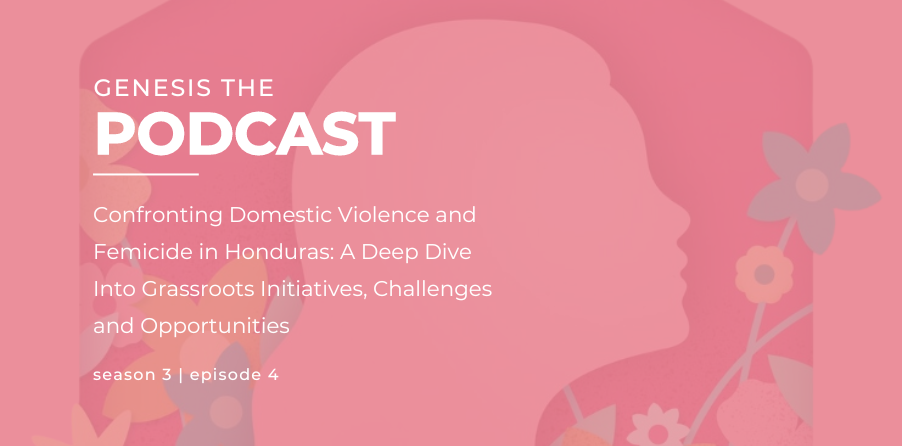Confronting Domestic Violence and Femicide in Honduras

A Deep Dive Into Grassroots Initiatives, Challenges and Opportunities
Season 3, Episode 4
Confronting domestic violence and femicide in Honduras is a formidable challenge. This struggle forms the heart of our latest podcast episode, where we delve into the realities of these issues and the urgent need for solutions.
Domestic violence is a pervasive problem in Honduras, and the alarmingly high rate of femicide in the country is testament to this crisis. The episode features Genesis Women’s Shelter & Support Chief Executive Officer Jan Langbein and Chief Clinical Officer Ruth Guerreiro, who unpack the prevalence of femicide and domestic violence in Honduras and illuminate the pressing need for robust solutions.
As we journey through the thriving community of Siguatepeque, we peel back the layers of the unique challenges of building a domestic violence agency in Latin America. From transportation hurdles to security issues, the road to change is fraught with difficulties. Yet, the potential for change is immense, particularly with volunteers in the city spearheading a transport system and legislative reforms. What’s more, Genesis has become a beacon of hope in planning and developing a new shelter in Siguatepeque, offering strategic direction, trauma-informed resources and hands-on collaboration with city leaders.
One of the episode’s most striking features is the story of a local police officer who, against all odds, managed to connect a young victim of domestic violence with a social services program. This tale serves as a potent symbol of the strides a community can make when it rallies together to combat domestic violence. Additionally, we explore the inspiring efforts of the Mayor and First Lady of Siguatepeque, who are leading the charge to raise funds for Casa Rosa Shelter.
In this episode, we also discuss the role of a domestic violence agency in reducing femicide in Honduras. If women have a safe space to escape abusive relationships, they are naturally less likely to be in harm’s way. With the combination of a safe space, increased awareness, and legislation that supports victims, we can foster a societal paradigm shift towards intolerance of domestic violence.
Working to bring an end to domestic violence and femicide extends beyond individual efforts and community initiatives. It involves a systemic change in societal attitudes towards these issues, enforcement of laws and an empowered community ready to take action. As we have seen here in Dallas, when leaders take a stand against domestic violence, transformative changes can happen.
The fight against domestic violence and femicide in Honduras is daunting, but not impossible. It takes a village to bring about change, and we stand on the shoulders of those who dared to say that domestic violence is not acceptable. By believing in her and supporting her, we can start to change the narrative and put an end to femicide in Honduras and around the world.
To listen to this episode of Genesis the Podcast, click here.
